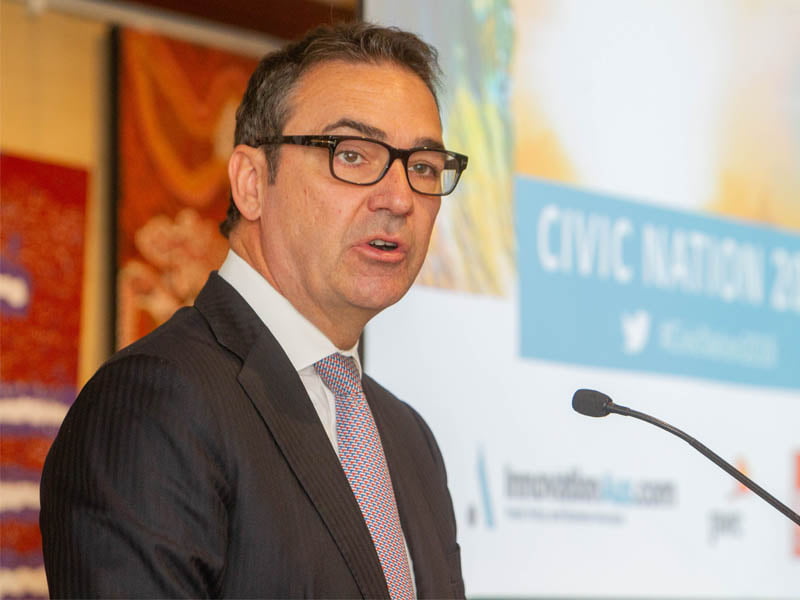South Australian Premier Steven Marshall has lauded the state’s home quarantine app as a “great innovation” and revealed plans to expand its use around the nation as Australia’s borders re-open.
The South Australian government is currently conducting a pilot of the Home Quarantine SA app, which uses facial recognition technology to confirm a user’s identity and location, with about 50 people who have returned to the state from New South Wales.

Using the app, these people are quarantining in their homes and providing multiple check-ins to prove they are at that location. Those check-ins involve the use of facial recognition and geolocation, with users given 15 minutes to confirm their location and identity when required.
If one of these check-ins is missed, they will get a call from the Home Quarantine SA team, and if that is missed too, then a compliance officer will be sent to the address.
A similar app has been used in Western Australia now for several months, and it appears likely other offerings with similar functionality will be used across the country as state and national borders open.
Mr Marshall has said the current pilot has been successful so far and will be broadened in the coming months, with Australian Defence Force personnel next in line.
“The trial’s underway now, we’re into our third week. I think it’s a great innovation that can be rolled out right across the country. Ultimately, home-based quarantine has got to be preferable…but it’s got to be safe as well,” Mr Marshall told Sky News on the weekend.
Prime Minister Scott Morrison also pointed to the quarantine apps in an interview on the weekend.
“The technology is there to do it. It’s just important that the states get in a position to scale that up, so vaccinated Australians, once we hit 80 per cent, can take off again,” Mr Morrison said.
Privacy and civil rights advocates have raised some concerns with the use of facial recognition to track the location of individuals undertaking home quarantine.
Deakin University senior lecturer and Australian Privacy Foundation vice-chair Dr Monique Mann said the use of such technology for surveillance is troubling, but may be the best option available to governments around the country.
“I can see that this app serves a purpose and what are the alternatives? We’ve got hotel quarantine, we’ve got ankle bracelets, but I’m not sure either of those are necessarily better options, and I think people will be more inclined to use an app like this than have an ankle bracelet on,” Dr Mann told InnovationAus.
“Under circumstances where it is necessary, proportionate and the least invasive form, and serving a legitimate objective, then it may be suitable and appropriate, but we need to ensure there are appropriate safeguards, particularly around the regulation of facial recognition.
“There have been a series of calls by a range of different groups and individuals for a moratorium on the use of this technology until the appropriate regulatory frameworks are in place.”
But Dr Mann said she is concerned about potential scope creep and the normalisation of technological surveillance during the pandemic.
“I’m really concerned about this normalisation of surveillance and surveillance technology under the cover of COVID, where people in society become used to or accept that there are all of these intrusions into their life,” she said.
“We have all of these tech solutions to problems presented by COVID. It’s surveillance solutionism. The pandemic in particular is really just facilitating this type of surveillance solutionism. Everything is solved with the solution of surveillance – it’s really problematic. Where does it go next?”
The SA quarantine app is marketed as a “safe, sustainable and cost-effective alternative to medi-hotel quarantine”. The privacy statement for the app states that information collected through it, including biometrics, will be “encrypted immediately upon submission”, and then transferred to a secure server in Australia under control of the SA government.
“This information is used solely by the government of South Australia for compliance with directions under the Emergency Act 2004 as amended from time to time and / or contact tracing activities,” the privacy statement says.
“This information will be destroyed at the conclusion of the COVID-19 pandemic unless required for enforcement purposes for any alleged breach of a direction by you under the Emergency Management Act 2004. If used for these purposes the information will only be retained as long as necessary.”
Information collected by the app includes geolocation data, the device’s camera for facial recognition purposes and access to device information to ensure it is “not jailbroken or a user has obtained privileged control of the device”.
Home Quarantine SA will be operated in compliance with the Information Privacy Principles, the government said.
“We will take reasonable security measures to protect personal information from loss, unauthorised access, use modification, disclosure or other misuse. We will ensure personal information is stored securely, not kept longer than necessary, and disposed of appropriately,” the privacy statement says.
“Strong data encryption mechanisms are also used to protect your personal information during data transmission and when your data is stored.”
There have been ongoing concerns among civil and digital rights advocates and legal organisations about COVID-19 measures that potentially breach the privacy of individuals, and their potential for misuse.
Multiple police forces around the country have attempted to access data from QR code check-in apps, with only a handful of states moving to completely block this.
Privacy Commissioner Angelene Falk this month said this could “undermine” contact tracing efforts, the main purpose of the apps, and called for police access to be prohibited.
Do you know more? Contact James Riley via Email.

